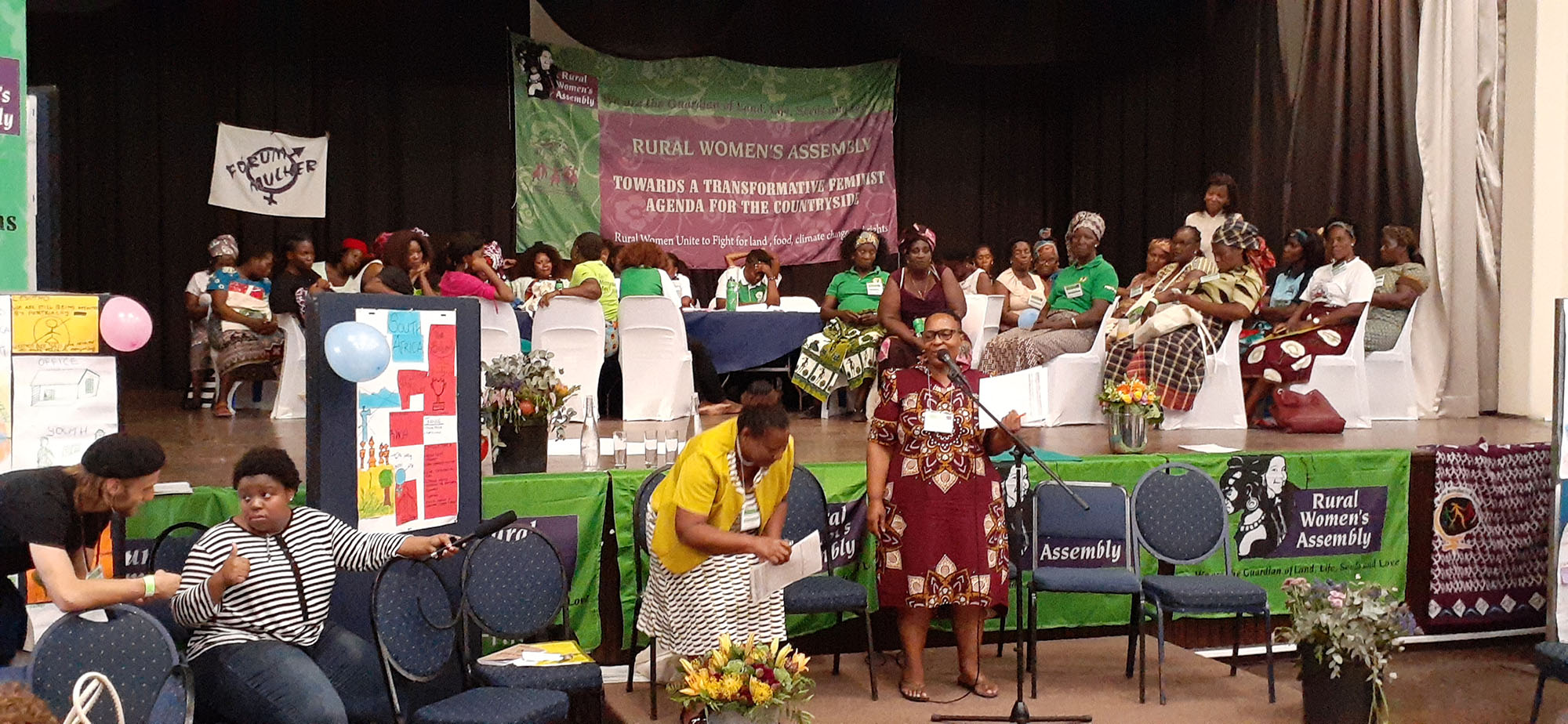Travelling in caravans, hundreds of rural women from Zambia, Zimbabwe, Swaziland, Lesotho, Malawi, Mozambique, and Namibia trekked their way to Johannesburg to gather for the Rural Women’s Assembly’s (RWA) 10th-anniversary conference. Of the many issues that the women tackled, the climate emergency was central to many of the discussions.
They formed an alliance of rural women from southern African countries who gathered over three days to teach and share sustainable farming methods, ideas on African feminist perspectives and restoring indigenous farming practices – as part of a broader movement to empower rural women.
“As RWA we are fighting the issues of climate change,” Flaida Macheza from Mozambique told Daily Maverick. “We are thinking of mechanisms to help us become resilient, and how we can accommodate issues of climate emergency in our own daily lives.”
Just three weeks ago, a global cohort of about 11,000 scientists endorsed research that the climate emergency should be given the urgency it requires, and stringent measures must be implemented, solidifying the many calls from activist groups, researchers and global citizens to declare climate emergency a crisis.
However, a bigger challenge in the climate emergency narrative is how the discourse is often had at a high-end level at the expense of excluding marginalised groups like rural women, who live closest to nature. Macheza told Daily Maverick that as a result of indigenous knowledge, often these women know that the climate is changing – sea levels are rising, and the globe is getting warmer – but are not equipped with resilience tools to help sustain their crop production and maintain food sovereignty.
“They see this in their crops, rain patterns and how farms are relying more on chemical fertilisers to fast-track harvest time,” Macheza said.
The Rural Women’s Assembly was established in 2009 and its founding mandate was to represent rural women who work on farms, and it bolsters a cohort of more than 20,000 rural women in small-scale farming, manufacturing, crafts making and other trades.
Gender inequalities persist in rural areas and are evident in rural women’s unequal access to power and resources that widen gender gaps. Fifty percent of Africa’s population constitutes women and about 80% reside in rural areas, with most employed in agriculture.
 Delegates put together a mini market and sold their crafts, produce and manufactured goods. (Photo by Ayanda Mthethwa)
Delegates put together a mini market and sold their crafts, produce and manufactured goods. (Photo by Ayanda Mthethwa)
The Rural Women’s Assembly runs leadership, feminist and home schools across all regions where it has members.
“The unfortunate thing about feminism, as with any other ideology, is that it’s not always well understood by those that are not within the same circle,” said Virginia Muwanigwa, CEO of the Zimbabwean Gender Commission.
“What is important is that for those that call themselves feminists, they have to be able to package the message of feminism in day-to-day language,” she added.
Macheza said that in the 10 years that the alliance has existed they have witnessed many of the rural women return to their communities and establish spaces for idea sharing and skills transfer – spaces that empower women to find their voice and fight for each other’s rights and those of their children.
 Conference attendees participated in various practical activities and discussions. (Photo: Ayanda Mthethwa)
Conference attendees participated in various practical activities and discussions. (Photo: Ayanda Mthethwa)
Alice Kachere, 49, has been a small-scale farmer for almost 16 years and she grows groundnuts, soya, beans, sweet potatoes and maize. Born in Lilongwe, Malawi, she says she grew up in a family that farmed for sustenance. Though her farming career was moulded at home during her childhood, she says it was only after the death of her second husband in 2003 that she considered formalising it.
Kachere said weather patterns in Malawi affect women and children the most as was witnessed when cyclone Idai killed more than 1,300 people.
“Climate change is real, and it is among us. We are affected by climate change as farmers. Often, in our monthly meetings, we discuss the issue and come up with solutions. We have been encouraging farmers to use more indigenous seeds because they promote soil resilience,” said Kachere.
Patriarchy has a stronghold in rural areas resulting from cultural and religious norms, with some still rooted in a belief system that commodifies women. Many of the discussions held from the first day of the conference provided a platform for an African-feminist perspective for rural women.
A small market was put together for the women to sell and display their produce and crafts, which ranged from beaded jewellerey and handwoven bags to blankets, herbal medicines, beans, dried fish and maize.
Macheza told Daily Maverick that they have received many calls from other African countries not covered in the southern region who need a safe space like the Rural Women’s Assembly. But often the political climate of some countries renders their efforts impossible.
“Moving forward, we need to capacitate leadership. We like to see each country having a strong Rural Women Assembly and we would really like to see the intellectual property of seeds in the hands of the peasant, rural women and not with companies,” said Macheza. DM




 Conference attendees participated in various practical activities and discussions such as knitting, bead making, agroecology, feminist perspective meant to empower the women. (Photo: Ayanda Mthethwa)
Conference attendees participated in various practical activities and discussions such as knitting, bead making, agroecology, feminist perspective meant to empower the women. (Photo: Ayanda Mthethwa)